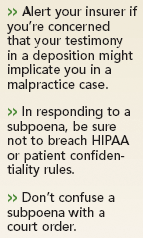Article
Subpoenaed? Don't panic
Author(s):
Malpractice Consult
Physicians are routinely subpoenaed to provide copies of their medical records and give testimony concerning care they've rendered. So if you receive a subpoena, don't panic: It doesn't necessarily mean you're being sued.
But regardless of why you've been served with a subpoena, you have to handle it very carefully. Here are guidelines:

In other cases. Perhaps a lawyer simply wants your patient records for an accident or disability case.
Rules governing subpoenas vary from state to state and court to court, and your obligations to comply usually depend on whether the document has been properly issued, signed, and served. To make sure that a subpoena is valid, determine-or ask your attorney to determine-what court or agency is involved, and whether the matter concerns a civil or criminal case. This information is generally available in the caption (the heading on the document that shows the names of the court and parties involved).
Providing information or testimony in response to an invalid subpoena, or one that improperly seeks privileged information, can lead to serious problems if you breach physician-patient confidentiality or a patient's right to privacy. Depending on the situation, you may need to obtain a HIPAA-compliant patient consent to release the records or other information sought, or alert the patient that a subpoena has been issued for that information so the patient has an opportunity to object to its release.
If the patient hasn't been notified, or objects to having his records released, you shouldn't comply without a court order. A subpoena isn't a court order. One exception to this rule is if the information is being subpoenaed by a state licensing board or another government agency. In these cases, check with your attorney.
Find out, too, whether you're being asked to provide expert testimony. While you can be subpoenaed to give fact testimony, you generally can't be compelled to give expert testimony. If an attorney seeks your expert opinion and you're willing to provide it, you have the right to be paid for that opinion.
Testifying in a legal proceeding can take up large chunks of your day. If the time or place written on the subpoena isn't convenient for you, ask the issuing attorney to change it. If you're required to testify before a court or other tribunal, ask the attorney to place you on two-hour notice.
Your attorney can help you develop a policy for dealing with subpoenas. Once that policy is in place, you won't have to get a legal opinion in every instance.

The author is a health law attorney with Kern Augustine Conroy & Schoppmann in Bridgewater, NJ, and Lake Success, NY. He can be reached by e-mail at kern@drlaw.com
.
This department addresses common professional liability issues. It isn't intended to provide specific legal advice. If you have a question, please submit it to Malpractice Consult, Medical Economics, 123 Tice Blvd., Suite 300, Woodcliff Lake, NJ 07677-7664. You may also fax your question to 201-690-5420 or e-mail it to memalp@advanstar.com
.





